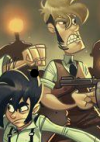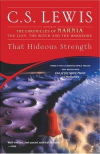
Lost Girls
by Alan Moore and Melinda Gebbie
Short Review
Read If: you love gorgeous erotic artwork, you like to read thought-provoking subject matter, you enjoy retelling of classic stories with lots of sex added
Don't Read If: you hate the mere idea of pornography, you refuse to read anything that broaches seriously taboo issues, you just want really classy-looking masturbation material
Long Review
This is a tough review, because Lost Girls is often a difficult book to read. Melinda Gebbie has referred to it as a "beautiful book of sex," and the graphic novel is certainly that at face value. The plot of the book revolves around adult versions of Peter Pan's Wendy, Alice from the Alice's Adventures in Wonderland books, and Dorothy from The Wizard of Oz meeting up by chance in an Austrian hotel at the brink of World War I. Together, the women share their past sexual adventures (erotic retellings of the classic stories), while embarking on the expenditure of their current sexual horizons. The book is unabashedly pornography, with many varied sexual situations gracing nearly every page. The squeamish need not apply; especially since the book explores many taboo sexual situations, up to and including pedophilia, bestiality, and incest. The book waves aside any moral implications involving these kind of sexual relationships, as after all, it is just fiction. However, I at least could not help but become somewhat disgusted with some of the more graphically upsetting scenes, even if I could accept it as an artistic exercise and plot device. If you could not stand reading Lolita, you should stay far away from Lost Girls. However, both books have merits far beyond any depiction of socially reprehensible actions.
The art in Lost Girls is simply gorgeous; lush, vibrant, and expressive. There is tons of erotic detail packed into every page, and the book greatly succeeds as a visual expression of humanity's sexuality. Moore's writing in the book is generally minimal and tends towards straight eroticism, with many clever allusions and metaphors. However, beyond mere pornography, Lost Girls has an agenda. It is a direct response to the glorification of violence seen in media, and the looming approach of World War I is felt throughout, adding a dark tint to any sexual ecstasy. The book mourns the vilification of human sexual acts, and raises questions regarding the modern world's Puritanical beliefs regarding pornography. A celebration of sex in all forms, Lost Girls is beautiful, thought-provoking, and sometimes extremely sad. Reading it was a singular experience, and I think anyone who takes the time and effort to read through the volumes will gain something from it. All in all, Lost Girls is a successful if extreme venture into the world of artsy porn, and stands as a thoughtful and moving expression of that famous and all too topical phrase, "Make love, not war."




